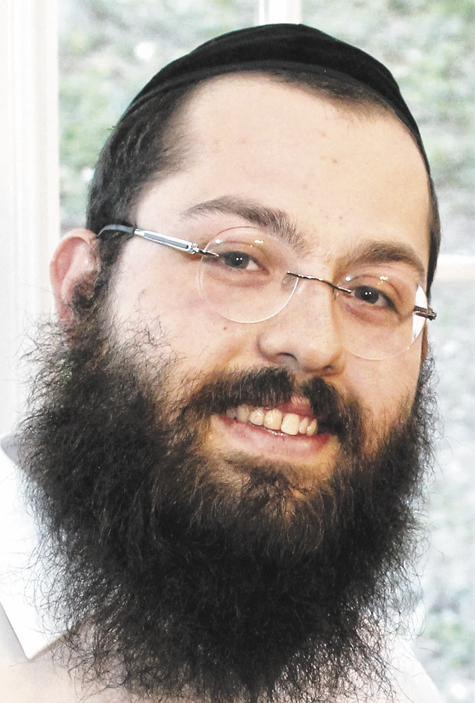Planting the seeds in God’s garden

By Rabbi Elchonon Chaikin, Chabad of Greater Dayton
On July 6, world Jewry as a whole and Chabad-Lubavitch in particular will mark the 25th yahrzeit (anniversary of death) of Rabbi Menachem Mendel Schneerson of blessed memory, known simply as “the Rebbe.”
There is so much to write about the Rebbe on this occasion. Through the Rebbe’s vision for Jewry and the world, his scholarship and sage advice, and his unconditional love for every Jew, the Rebbe changed the landscape of Judaism forever.
Fourteen months ago, inspired by the Rebbe’s teaching that every single Jew is infinitely valuable and that each one is irreplaceable, my wife, baby, and I moved out to Dayton to work with young Jews.
Many a time since, I have thought: what makes me attracted to this leader, whom I’ve never met, never interacted with, and who had passed a mere six months after I was born? What makes him the central inspiration in my life, my wife’s life, and the lives of our friends?
The Rebbe saw the world on a different plane. He saw what the world is truly made of, and the deep possibilities of what the world can be. The Rebbe would often say, “The world is a garden — not a field that produces grain, but a garden that produces fruit. The world is God’s personal garden.” The Rebbe saw that humanity’s true powers lie within, in each person’s God-given abilities and in the soul that yearns to shine with the brilliance of a diamond.
He challenged everyone he met or encountered to search within the depths of their soul to find a precious and invaluable gem.
The famed scholar Rabbi Adin Even-Yisrael (Steinsaltz) once described it in the following words:
“Imagine you are an eagle, but you think you’re a duck and you live like a duck. When someone comes and tells you that you are an eagle, you spread your wings and you soar up to heaven and you rise above everything. This is the touch the Rebbe had.”
This outlook brought the Rebbe to focus intensely on the coming of Moshiach (Messiah). He saw that there will be a time in which world peace can and will be a reality, because people and the world at their core are pure and good. All it takes is for people to look within themselves and reveal that inner goodness.
The Rebbe lived in order to inspire others to change the world. He asked every person to view every moment of their life in the way Maimonides describes, “The world shall be viewed like an evenly balanced scale, so that just one deed will tip the balance.”
The Rebbe professed the inherent value of a single mitzvah to tip the scale for the good. Whether it be through lighting Shabbat candles, or putting on Tefillin, through giving charity or helping another person, all it may take is one mitzvah to tip the scale for good.
The Rebbe didn’t stop there. He called on mitzvah-doers to inspire others to do the same.
Many would come to the Rebbe and talk about his great impact on the world and his incredible abilities, but the Rebbe would respond by asking the people what they had done personally and in their community to add on to the performance of mitzvot.
He asked if they were planting seeds for fruit to grow in God’s garden.
It wasn’t enough for them to rely on the Rebbe to inspire people; it is the duty of every individual to inspire another.
In 1987, Columbus businessman Gordon Zacks visited the Rebbe during the Rebbe’s Sunday Dollar for Charity distribution. It had been 17 years since he had last seen the Rebbe. At that time, the Rebbe had encouraged him to add to his observance of mitzvot and it had been 10 years since he had written him his last letter. When Mr. Zacks reached the Rebbe, the Rebbe looked at him and asked, “What are you doing for Jewish education?”
“It was as though I had just walked back into his office. In truth, hundreds of thousands of people had filed past him over those years,” said Mr. Zacks.
“You are amazing!” Zacks exclaimed to him.
But the Rebbe responded, “What does the fact that I am amazing have to do with saving Jewish lives? What are you doing for Jewish education?”
The Rebbe hoped each person would see their responsibility toward their fellow Jew and act upon that vision.
Rabbi Lord Jonathan Sacks famously said about the Rebbe, “Good leaders create followers; great leaders create leaders.” The Rebbe was looking for those who would lead and carry the load, by starting with themselves and inspiring others to do the same.
With this in mind, it’s no wonder that 25 years later, Chabad is still growing. It’s because the Rebbe didn’t leave a legacy. Instead, the Rebbe left marching orders.
Youths today are looking for an existential purpose. They ask, “Do I matter? Can I contribute?” The Rebbe’s answer would be — and is — “Yes, you do. You are everything.”
Remember whose garden this world is. Your job is to plant the seeds for fruit to grow in your patch, inspire others to grow fruit in their patch, and keep at it until the whole world is a garden filled with beautiful and luscious fruit.
To read the complete June 2019 Dayton Jewish Observer, click here.



